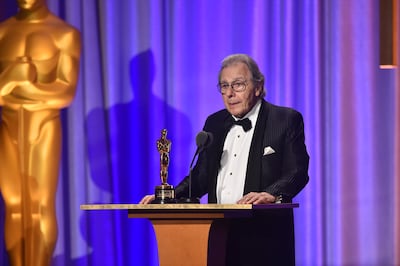The Mission: Impossible score is just one of the unforgettable elements that have become a mainstay in the popular action film franchise.
But long before it was linked to Tom Cruise and his thrilling stunts, it was already a hit when it was first released in 1967 thanks to the original television series starring Steven Hill. The piece has been reworked by generations of film composers and pop stars without outshining the original.
Ahead of Mission: Impossible – Dead Reckoning Part One releasing in UAE cinemas on Sunday, here are five things you need to know about the score.
1. It was composed by Lalo Schifrin

The theme is composed by a master of the form.
At 91, Argentine composer Lalo Schifrin has been soundtracking Hollywood films and television shows for more than 70 years.
Throughout that time, he won six Oscars and five Grammy Awards, in addition to penning memorable scores for action films, including 1973’s Enter the Dragon, 1977’s The Eagle has Landed and all three entries of the Rush Hour series.
A jazz composer at heart, Schifrin’s work is defined by a love of Big Band arrangements and strong percussion, the latter which saw him delve into various styles such as rock and tango.
2. The theme took three minutes to write
For such an influential score, writing it took about as much time as its official duration.
In an interview with New York Post in 2015, Schifrin recalled being as asked by Bruce Geller, producer of the original Mission: Impossible television series, to "write something exciting, something that when people are in the living room and go into the kitchen to have a soft drink, and they hear it, they will know what it is."
Schifrin punched out the score in three minutes because orchestration is one of his biggest strengths.
“It’s like writing a letter,” he said. “When you write a letter, you don’t have to think what grammar or what syntaxes you’re going to use, you just write a letter. And that’s the way it came.”
3. U2 and Limp Bizkit did their own version
The Mission: Impossible theme has been reimagined and interpolated as part of the film series.
For the first instalment in 1996, U2 bassist and drummer Adam Clayton and Larry Mullen Jr created a dance-friendly variation of the original score.
For 2000's Mission: Impossible II, US band Limp Bizkit used the main riff of Schifrin’s work for the film’s official rap-rock theme song Take A Look Around.
While Mission: Impossible III featured an additional new theme by rapper Kanye West called Impossible, the remainder of the series feature reworked versions of the original work by film composers including Michael Giacchino, Joe Kraemer and Lorne Balfe.
4. It was Bruce Lee's favourite gym tune
Martial arts film star Bruce Lee perfected his skills whilst listening to Schifrin's score.
In an interview with the Academy Television Foundation, Schifrin recalls meeting Lee in the late 1970s, whilst writing the score for Enter the Dragon.
Schifrin was surprised to learn Lee was a fan of the Mission: Impossible theme tune.
"Bruce Lee told me that he was practising martial arts in his dojo in Hong Kong to the rhythm and music of Mission Impossible," he said.
"Now, I don't have a big ego... at that moment, my preoccupation wasn't about how this made me feel. All I knew was I needed to come back home and finish work on the (Enter the Dragon) score.”
5. It was a minor hit in the US charts
The original score cracked the top 50 of the US charts and won two Grammy Awards for Best Instrumental Theme and Best Original Score for a Motion Picture or TV Show.
At the 1997 Grammy Awards, two versions of the work – an updated one with Schifrin and the London Philharmonic Orchestra and the aforementioned track by Clayton and Mullen Jr – were nominated for Best Pop Instrumental Performance.
In what was considered a minor upset, both lost out The Sinister Minister by Bela Fleck and the Flecktones.


